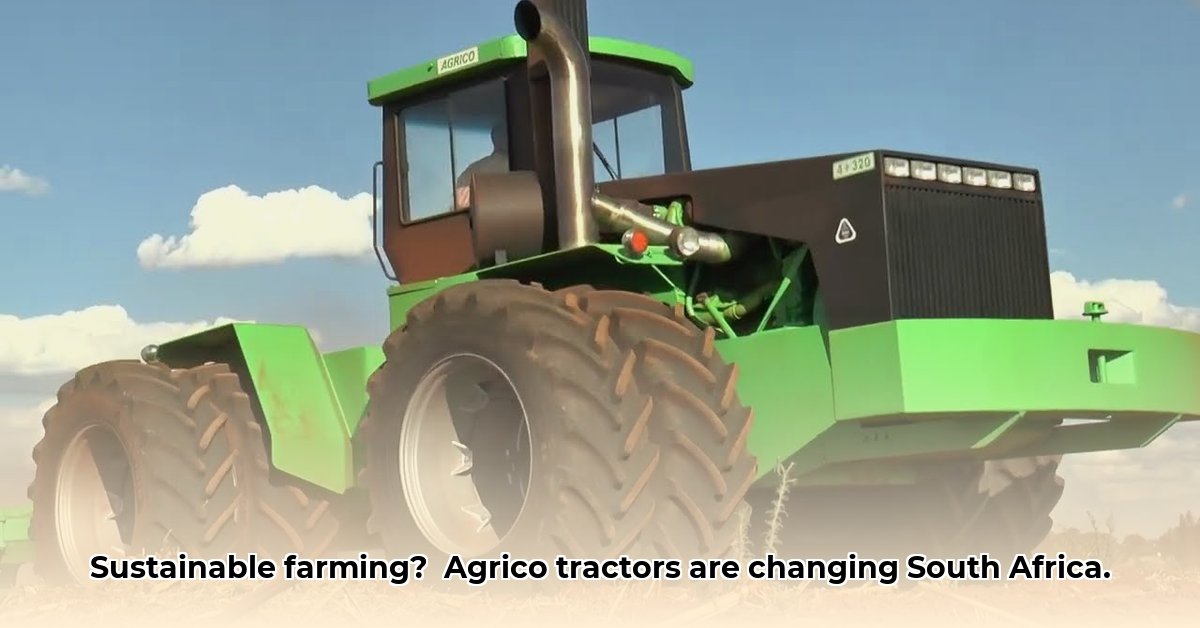
For over seven decades, Agrico tractors have been a ubiquitous presence on South African farms, silently contributing to the nation's food security. Their enduring presence speaks to their reliability and adaptability to diverse and challenging farming conditions. While precise figures on their market share remain elusive – a common challenge in accessing detailed data on South African agricultural machinery – their longevity suggests a significant impact on the country's agricultural history. This article explores Agrico's role, examining its past, its contribution to sustainable farming, and its potential future. For comparison, consider other brands like those featured on this Subcompact Tractor Guide.
Agrico's Enduring Legacy in South African Agriculture
Imagine the expansive, sun-drenched fields of South Africa. For generations, Agrico’s four-wheel-drive tractors have been instrumental in cultivating these lands. Their robust design and proven durability have made them a mainstay for farmers across the country. While comprehensive production figures remain unavailable, their continued presence underlines their enduring contribution to the South African agricultural landscape. This reflects an adaptability to varied terrains and evolving farming practices. The company's focus on durable construction has likely been a key factor in their longevity. But how significant is this contribution exactly? More data is needed for a definitive answer.
What role has Agrico played in improving farming efficiency? While detailed data is lacking, their powerful four-wheel-drive systems likely enhance land management, potentially minimizing soil erosion and optimizing land utilization. The long lifespan of these tractors also reduces waste, a direct contribution to sustainability. However, crucial questions remain unanswered: Are Agrico tractors fuel-efficient compared to competitors? Do they incorporate cutting-edge precision farming technology? Further research is necessary to quantify their precise environmental impact.
The Need for Greater Transparency in the South African Agricultural Machinery Market
A significant obstacle in completely understanding Agrico's contribution to sustainable farming is the lack of publicly available data. Information on market share, specific models, and technological details is surprisingly scarce. This isn't solely an Agrico issue; it's a broader concern affecting the analysis of the entire South African agricultural machinery sector. Improved data transparency would significantly benefit everyone involved: farmers, researchers, and policymakers alike. This would allow for a far more accurate assessment of the impact of these machines on the environment and the agricultural sector’s overall productivity.
How can we address this information gap? Increased data sharing, both by manufacturers like Agrico and the government, is crucial. This could, for example, include publicly accessible databases or standardized reporting requirements for agricultural machinery sales and performance. This, in turn, would enhance informed decision-making and allow for more objective evaluations of the sustainability and operational impacts of different technologies.
The Path Forward: Collaboration for a Sustainable Future
What does the future hold for Agrico tractors and sustainable farming in South Africa? It hinges on collaboration among various stakeholders. Agrico can improve its online presence and data transparency, providing farmers with detailed specifications and performance data. Farmers need access to financing options that support the adoption of more sustainable farming equipment. The South African government has a role in providing incentives for the uptake of sustainable technologies, as well as fostering cooperation between industry and research institutions. This collaborative effort ensures that detailed research can be done into the true environmental impact of these machines, along with the broader technological landscape.
This transparency will enable a more thorough assessment of Agrico's contribution to sustainable agriculture. It is undeniable that Agrico tractors have been a vital part of South African farming for decades, but a complete picture requires more accurate and publicly available information. Such transparency will allow for better planning for the future of agriculture in South Africa.
Key Takeaways:
- Agrico's long history in South Africa highlights the enduring nature of its tractors, reflecting reliability and adaptability.
- However, a lack of readily available data on precise specifications and sustainability metrics hinders a complete assessment of their impact.
- Improved data transparency from manufacturers, government initiatives, and collaborative research are crucial for a sustainable future in South African agriculture.